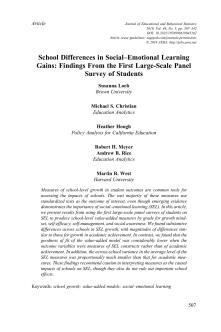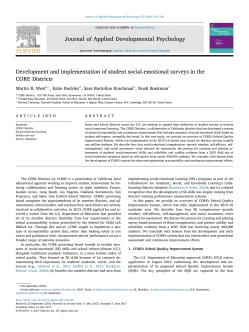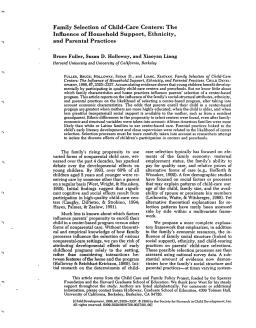Findings From the First Large-Scale Panel Survey of Students
Published
Summary
This article discusses the use of standardized tests as the primary tool for assessing school-level growth in student outcomes, despite the emerging importance of social-emotional learning (SEL). It presents results from large-scale surveys of students on SEL constructs, and finds significant differences across schools in SEL growth, with magnitudes of differences similar to those for academic achievement. However, caution is recommended in interpreting measures as causal impacts of schools on SEL, as the goodness of fit of the value-added model was considerably lower for SEL measures.
Published
Summary
States and school districts across the U.S. are seeking to expand their definition of student success to include social-emotional learning. The CORE Districts, a collaborative of California districts that has developed a system of school accountability and continuous improvement that includes measures of social-emotional skills based on student self-reports, exemplify this trend. In this case study, we provide an overview of CORE's School Quality Improvement System, which was implemented in the 2015–16 school year across six districts serving roughly one million students.
The Influence of Household Support, Ethnicity, and Parental Practices
Published
Summary
An investigation of the family factors and practices that influence parents' choice of center-based programs for young children. Maternal education, child's age, and availability of social support were found to be significant factors in center selection. African-American families were more likely to choose center-based care than white or Latino families, and parental practices related to early literacy development and close supervision also affected center selection. The study highlights the importance of considering selection processes when assessing the effects of early childhood programs.
Remembering the "Forgotten Half"
Published
Summary
US high school students, especially those who do not attend college, have been found to lack skills and knowledge necessary for the job market. The California Partnership Academies program has been developed to address this issue and has been adopted by over 50 high schools. The program has received support and positive evaluations. Factors contributing to the issue include societal changes, the education system, and changes in the labor market. If these issues are not addressed, the US risks falling behind international competitors and a lower standard of living.



